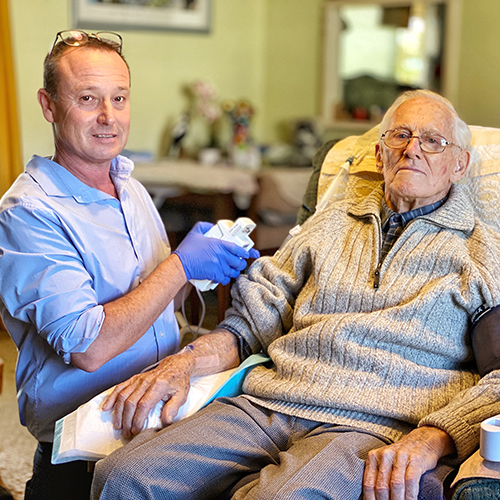09 June 2021
A trend from hospital to home-based care, accelerated during COVID-19, looks set to continue with the first evidence in Australia that regular blood transfusions can be safely performed in residential homes and aged care facilities.
The joint study, undertaken by the University of South Australia, the Royal District Nursing Service and SA Health, investigated 1790 blood transfusions involving 533 patients in South Australian homes and aged care facilities over a 15-year period.
Key findings included:

- The system used to deliver blood products to the patients was efficient and safe;
- There was less than one percent of adverse reactions, with these reactions not being serious and able to be managed by a registered nurse;
- The gender and age of the patient and their setting (including aged care facilities) was not a barrier to receiving a blood transfusion at home, and did not influence the risk of an adverse reaction.
The study overwhelmingly supports home blood transfusions for medically stable patients, according to UniSA lead researcher Dr Rebecca Sharp.
“Hospitals can be alienating and strange places for older people, especially those who have dementia,” Dr Sharp says. “It is better for eligible patients if a trained nurse can go to their home and perform the blood transfusion, following strict procedures.”
Study co-author and RDNS National Nursing Director Ms Lisa Turner says the research highlights RDNS meeting the growing trend of health care being delivered at home, not in hospitals, and leading the drive for the evidence base to support future care.
“Blood transfusions are not straightforward procedures, and our nurses are highly trained and specially skilled to conduct the transfusions safely in people’s homes,” Ms Turner says. “The RDNS is one of very few providers in Australia able to do this at any sort of scale, which is testament to our nurses’ expertise.
“Because we’re able to perform blood transfusions in homes safely, it has the added benefit of reducing the burden on our hospitals and public health system by freeing up beds and resources that can redirected towards other critical care.”
The study authors welcome the shift in healthcare from hospitals to homes in recent years as it cost effective, preserves, hospital beds, and better supports patient wellbeing.
“Treatment delivered at home is continuing to grow in importance – even more so during COVID – and our study shows that blood transfusions for stable patients could move in this direction too,” the authors say.,” the authors say.
Notes for editors
“Adverse events associated with home blood transfusion. A retrospective cohort study” is published in the Journal of Clinical Nursing. For a copy of the paper please email candy.gibson@unisa.edu.au
UniSA media contact: Candy Gibson T: +61 8 8302 0961 M: +61 434 605 142
E: candy.gibson@unisa.edu.au;
Silver Chain media contact: Ben Osborne M: +61 421 226 722. E: ben.osborne@silverchain.org.au



